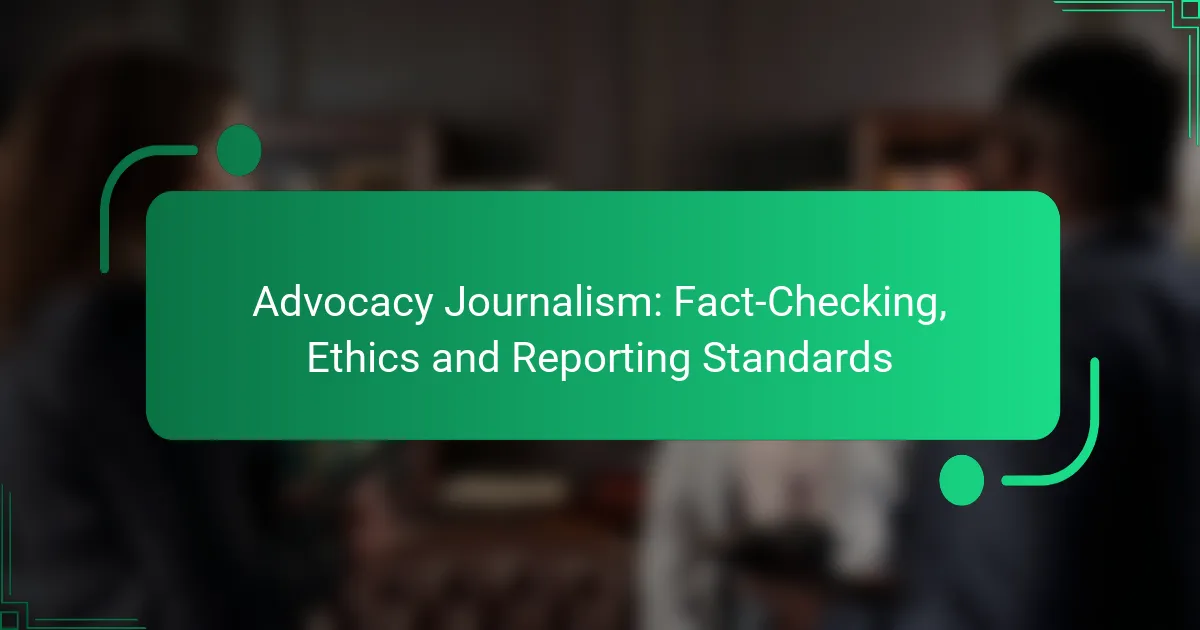Advocacy journalism plays a crucial role in ensuring accurate reporting through rigorous standards of fact-checking, sourcing, and verification. By prioritizing truthfulness and ethical practices, it balances the promotion of specific causes with the need for journalistic integrity, fostering credibility and accountability in the media landscape.
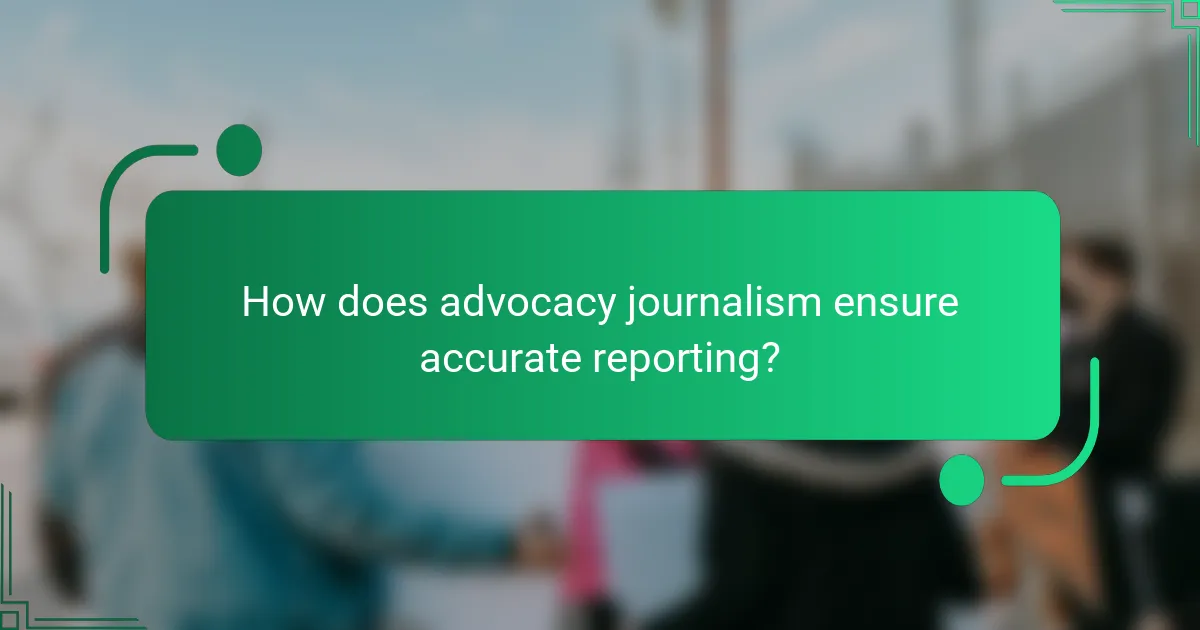
How does advocacy journalism ensure accurate reporting?
Advocacy journalism ensures accurate reporting by implementing rigorous standards for fact-checking, sourcing, and verification. This approach prioritizes truthfulness while promoting specific causes, balancing advocacy with journalistic integrity.
Fact-checking processes
Fact-checking is a critical component of advocacy journalism, involving a systematic review of claims made in articles. Journalists often utilize multiple sources to confirm the accuracy of information before publication. This process helps prevent the dissemination of misinformation and enhances the credibility of the reporting.
Common fact-checking methods include cross-referencing data with reputable databases and consulting experts in relevant fields. Journalists may also use checklists to ensure all claims are verified, which can significantly reduce errors.
Use of reliable sources
Utilizing reliable sources is essential for maintaining accuracy in advocacy journalism. Journalists should prioritize information from established organizations, peer-reviewed studies, and credible experts. This practice not only supports the integrity of the reporting but also builds trust with the audience.
When selecting sources, it is crucial to assess their credibility and potential biases. Journalists can benefit from a diverse range of sources to provide a well-rounded perspective on the issues they cover.
Verification techniques
Verification techniques are methods used to confirm the authenticity of information before it is published. These techniques may include checking the original documents, conducting interviews with primary sources, and using digital tools to trace the origins of data. Effective verification helps ensure that the information presented is accurate and reliable.
Journalists should be aware of common pitfalls, such as relying too heavily on social media or unverified online content. A thorough verification process can help mitigate these risks and uphold journalistic standards.
Collaboration with fact-checking organizations
Collaboration with fact-checking organizations enhances the accuracy of advocacy journalism. Many journalists partner with independent fact-checkers to review their work, which can provide an additional layer of scrutiny. This collaboration can be particularly valuable in contentious or complex issues where misinformation is prevalent.
Engaging with fact-checking organizations also allows journalists to stay updated on best practices and emerging trends in verification. By fostering these partnerships, advocacy journalists can improve the quality of their reporting and better serve their audiences.

What ethical standards govern advocacy journalism?
Advocacy journalism is guided by ethical standards that prioritize truthfulness, transparency, and accountability. These principles ensure that journalists maintain credibility while promoting specific causes or viewpoints.
Transparency in reporting
Transparency in reporting requires journalists to disclose their sources, methodologies, and any potential biases in their work. This openness helps audiences understand the context of the information presented and builds trust in the reporting process.
For example, an advocacy journalist might clarify their affiliation with a nonprofit organization while covering related issues. This practice allows readers to evaluate the potential influence of the journalist’s background on the story.
Accountability measures
Accountability measures in advocacy journalism involve mechanisms for addressing inaccuracies and ethical breaches. Journalists should have processes in place for correcting errors and responding to public criticism, which reinforces their commitment to integrity.
Common accountability practices include publishing corrections, engaging with audience feedback, and adhering to established ethical guidelines from professional organizations. These steps help maintain the journalist’s credibility and the public’s trust.
Conflict of interest policies
Conflict of interest policies are essential for ensuring that advocacy journalists do not allow personal or financial interests to compromise their reporting. Journalists should avoid situations where their objectivity could be questioned, such as accepting funding from organizations they cover.
To manage conflicts of interest, journalists can implement disclosure practices, such as informing readers of any financial ties to the subjects they report on. This transparency helps maintain ethical standards and fosters trust with the audience.
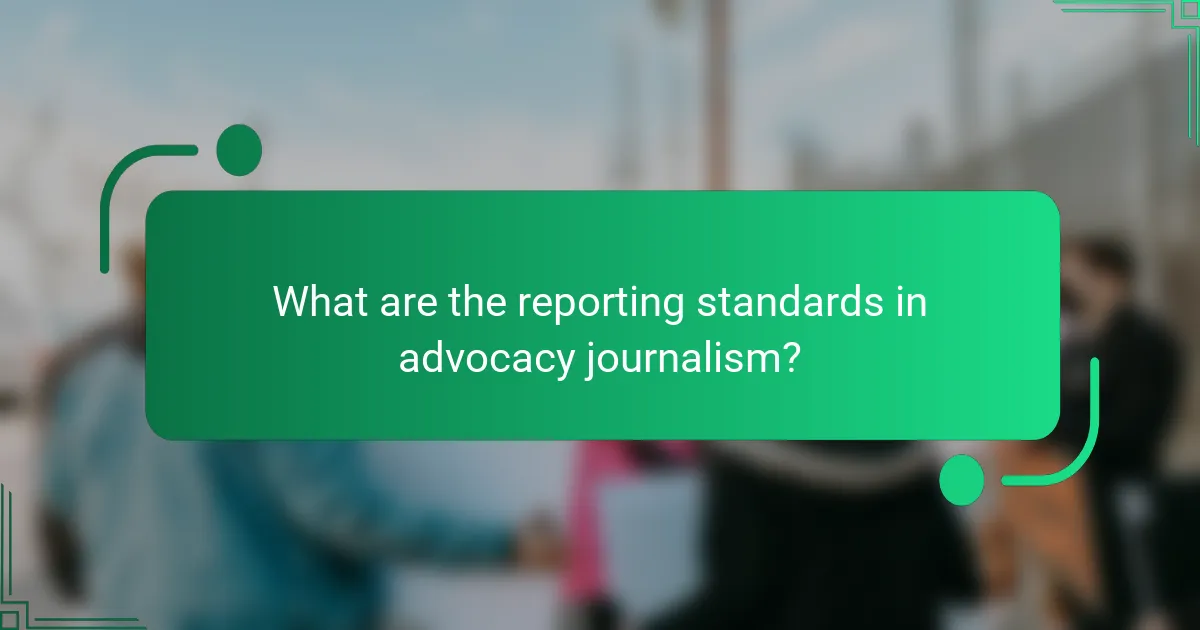
What are the reporting standards in advocacy journalism?
Reporting standards in advocacy journalism emphasize the importance of accuracy, fairness, and ethical practices. These standards guide journalists in presenting information that supports their causes while maintaining credibility and integrity.
Accuracy and fairness
Accuracy in advocacy journalism means presenting facts truthfully and without distortion. Fairness involves giving a complete picture by including multiple perspectives, especially those that may contradict the advocate’s position.
To ensure accuracy, journalists should verify information through reliable sources and cross-check facts. Fairness can be achieved by acknowledging opposing viewpoints and addressing them respectfully, which enhances the credibility of the advocacy effort.
Balance and impartiality
Balance in advocacy journalism requires presenting various sides of an issue, even when the journalist has a clear stance. Impartiality means not allowing personal biases to influence the reporting, which is crucial for maintaining trust with the audience.
Journalists should strive to include voices from different stakeholders, ensuring that marginalized perspectives are not overlooked. This approach not only enriches the narrative but also fosters a more informed public discourse.
Attribution of sources
Attributing sources in advocacy journalism is essential for transparency and accountability. Proper attribution allows readers to trace the origins of information and assess its reliability.
Journalists should clearly cite sources, whether they are experts, studies, or public records. This practice not only enhances the credibility of the report but also protects against potential misinformation. Using reputable sources, such as peer-reviewed journals or recognized organizations, strengthens the overall argument.
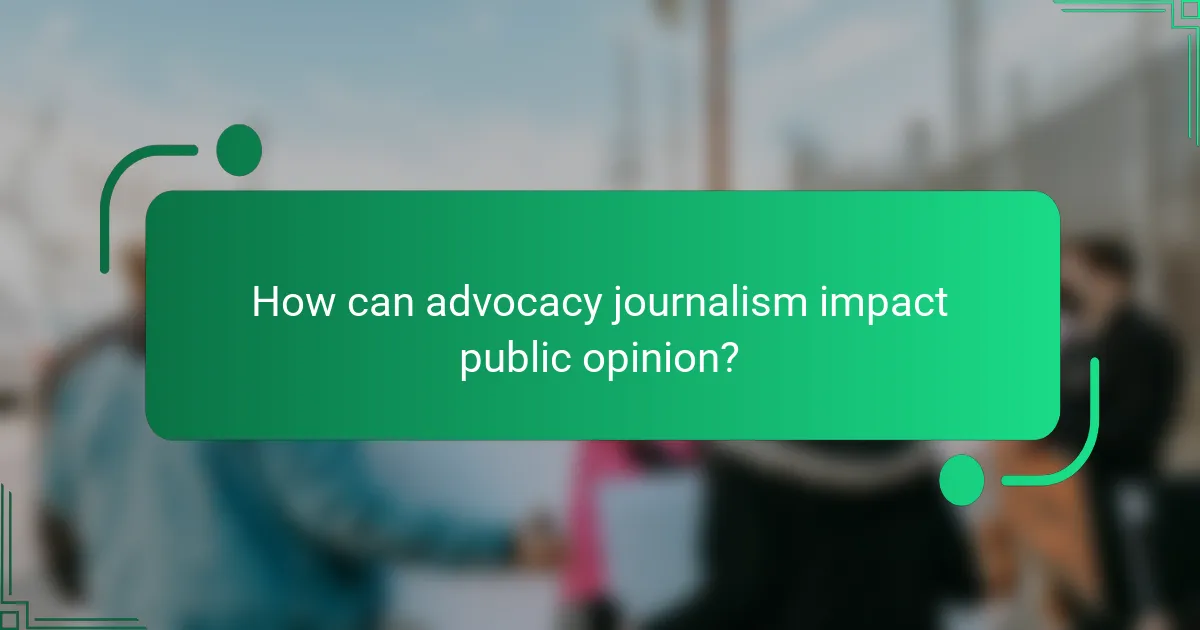
How can advocacy journalism impact public opinion?
Advocacy journalism can significantly shape public opinion by highlighting specific issues and presenting them in a way that resonates with audiences. This form of journalism often seeks to influence perceptions and drive action on social, political, or environmental matters.
Influence on policy decisions
Advocacy journalism plays a crucial role in influencing policy decisions by bringing attention to pressing issues and mobilizing public support. When journalists report on topics like climate change or healthcare reform, they can sway lawmakers by demonstrating public concern and urgency.
For example, investigative pieces that reveal corruption or inefficiencies in government programs can lead to reforms or new legislation. Journalists can amplify voices from affected communities, making it harder for policymakers to ignore these issues.
Shaping societal narratives
Through framing and storytelling, advocacy journalism shapes societal narratives by defining how issues are perceived and discussed. By focusing on specific angles or human stories, journalists can create a narrative that resonates with the public, fostering empathy and understanding.
For instance, coverage of social justice movements often highlights personal experiences, which can shift public attitudes and encourage collective action. This narrative-building can lead to broader cultural shifts, as media representations influence how society views various topics, from immigration to gender equality.
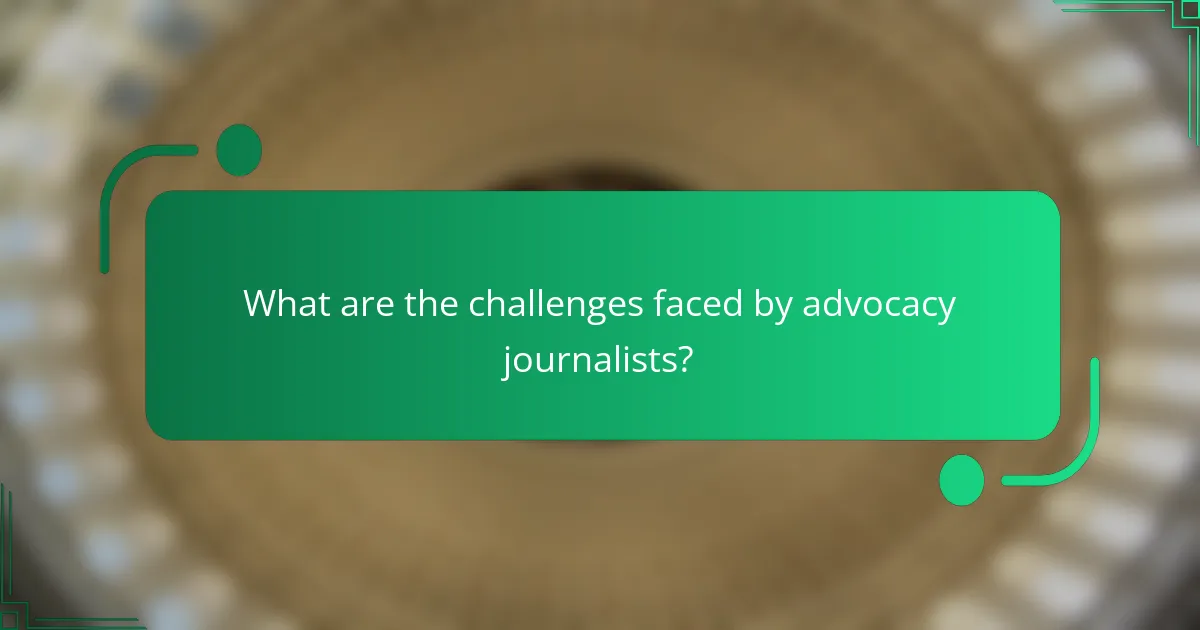
What are the challenges faced by advocacy journalists?
Advocacy journalists encounter several significant challenges that can impact their ability to report effectively. These include resource limitations, public skepticism, and legal threats that can hinder their work and influence their reporting standards.
Resource limitations
Advocacy journalists often operate with limited financial and human resources, which can restrict their ability to conduct thorough investigations. Many work for non-profit organizations or independent outlets that may not have the funding to support extensive reporting efforts.
To mitigate resource constraints, advocacy journalists can prioritize their stories based on urgency and impact. Collaborating with other organizations or leveraging volunteer support can also enhance their capacity to cover important issues.
Public skepticism
Public skepticism towards media can pose a significant barrier for advocacy journalists. Many audiences may question the credibility of reports, especially if they perceive bias or a lack of objectivity.
To build trust, advocacy journalists should maintain transparency about their methods and sources. Engaging with the community through forums or social media can also help address concerns and foster a more informed audience.
Legal threats and censorship
Legal threats and censorship are persistent challenges for advocacy journalists, particularly in regions with restrictive press laws. Journalists may face lawsuits or governmental pressure that can limit their ability to report freely.
To navigate these risks, advocacy journalists should familiarize themselves with local laws regarding press freedom and seek legal counsel when necessary. Establishing strong networks with other journalists and organizations can provide support and resources in times of legal challenges.
